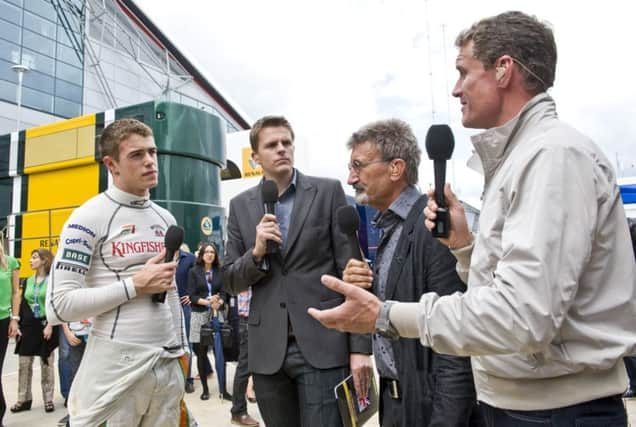David Coulthard: Paul di Resta needs Mercedes role


The 27-year-old will lead Mercedes’ assault this season on the German Touring Car Championship (DTM), a title he won for the manufacturer in 2010.
After four years, Di Resta was controversially dumped by Force India F1 at the end of last season, but talks are ongoing to dovetail the Scots’ DTM action with a test/reserve role within Mercedes GP, alongside former world champ Lewis Hamilton and Nico Rosberg.
Advertisement
Hide AdAdvertisement
Hide Ad“I can definitely see an opportunity for Paul there, because Mercedes motorsport boss Toto Wolff knows the DTM very well,” Coulthard explained. “He knows Paul and brought him in because he knows he can do a job for Mercedes. DTM is important for Mercedes, and they haven’t won it since Paul took the title in 2010. The F1 test/reserve role would be a big chance for Paul He’s a known quantity. He can drive a racing car and he can drive it quickly. I hope he gets that opportunity. If he doesn’t, it might be difficult to find his way back into F1, simply because of the political and financial nature of the business.”
As F1 teams gather in Bahrain today for the final four-day pre-season test, Coulthard – who continues as an analyst on BBC TV’s F1 coverage – hopes the new technical changes don’t turn the sport into a glorified fast fuel-economy run.
“I certainly hope it doesn’t turn out to be something similar to a quick economy run round the circuit,” the 42-year-old from Twynholm, smiled. “What F1 mustn’t lose is that old romantic, ‘kiss the girls, have a cigarette, jump in the car, thrash it, get back out, then party after receiving the winner’s laurel wreath’ image. The strong, sexy, powerful image is something we don’t ideally want to lose from F1. There’s a reason the James Bond franchise is still so successful today, because it’s kind of aspirational. It’s real, but it’s not real. F1’s the same, it should be a little bit James Bond, Certainly more James Bond than Brooke Bond.”
The raft of new technical rules include a new 1.6-litre V6 turbocharged engine, boosted by two electric motors generating 160bhp, plus just 100kg of fuel. The biggest shock of the opening eight days of testing – four in Jerez, and four last week in the first Bahrain test – has been the struggles of the previously all-conquering Red Bull
How badly has Red Bull and four-times champion Sebastian Vettel struggled? While it completed only 21 laps over all four days in Spain, McLaren’s Kevin Magnussen racked up 110 on the final day alone.
“Red Bull? Yeh, they’ve got problems this year. It’s not looking good, and there’s no quick fixes,” Coulthard, who drove for Red Bull in 2005-08 after 11 years with Williams and McLaren, admitted. “It appears there’s issues with the hybrid part of the car storing the energy and releasing the heat it generates. They might just be one manufacturer part away from solving it, or it may be a process of fixing that part, and the next part goes wrong. When you enter the competitive arena, you accept that there are no guarantees, and you have to take the good with the bad. But what happens with these great teams is that through adversity they are able to rally the troops and find a way out.
“The time you really find out about the team is not through the three or four years of winning, it’s in the difficult times. At the moment, it’s the difficult times Red Bull is going through.”
Despite the problems being endured by a number teams, Coulthard believes the majority of issues will be resolved by the start of the opening grand prix in Melbourne on 16 March.
Advertisement
Hide AdAdvertisement
Hide Ad“F1 should be the fastest form of closed circuit racing,” the TW Steel ambassador, who won 13 grands prix, and finished on the podium 62 times, continued. At the moment, the car’s aren’t running that quickly. GP2 is very close to it in terms of speed. And that’s not good, certainly as far as I see it. But there will be big, rapid advancements as the season progresses, of that I have no doubt. F1 has to be the fastest form of racing. It has to be physically challenging, mentally challenging. It has to be aspirational. And, until the first race starts, I think we have to keep an open mind. But at the moment, we’ve definitely taken a couple of steps back to get the longterm gain. And that’s always an uncomfortable situation.”
But Coulthard, despite his immediate concerns about the state of F1, is in no doubt the rule changes – many of them aimed at developing reusable energy – were necessary. “Is there pressure to find other forms of energy? Absolutely,” he said. “We’re living in those times. Do all the manufacturers embrace hybrid technology? Yes they do. Is Formula 1 a proving ground and a development centre for technologies we use in our everyday lives? Unquestionably, yes.
“At certain points there has to be a leap of faith in the development of new technology. We’re living that right now in terms of F1.
“It will work. It will be a bumpy road. There will be failures. There will be embarrassment. But at the end of it, there will be a winner.”